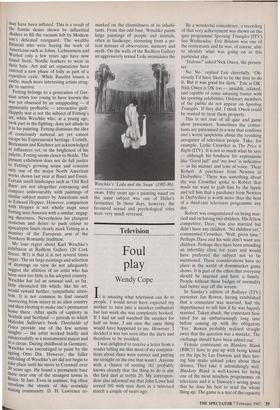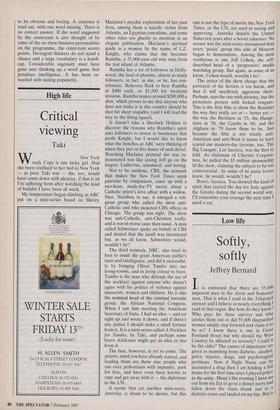Television
Foul play
Wendy Cope
It is amazing what television can do to people. I would never have expected my mother to turn into a snooker enthusiast but last week she was completely hooked. If I had sat and watched the snooker for half an hour, I am sure the same thing would have happened to me. However, I decided it was too soon after the darts and therefore to be avoided.
I was delighted to receive a letter from a reader telling me that most. of my computa- tions about darts were correct and putting me straight on the one that wasn't. Anyone with a chance of scoring 161 probably knows already that the thing to do is aim the first dart at treble 20. My correspon- dent also informed me that John Lowe had scored 501 with nine darts in a televised match a couple of years ago. By a wonderful coincidence, a recording of that very achievement was shown on the quiz programme Sporting Triangles (ITV) last Wednesday. Eric Bristow was one of the contestants and he was, of course, able to identify what was going on in this particular clip.
`Jealous?' asked Nick Owen, the presen- ter.
No. No.' replied Eric cheerfully. 'Ob- viously I'd have liked to be the first to do it. But it was good for darts.' Eric is OK. Nick Owen is OK too — amiable, relaxed, and capable of some amusing banter with his sporting celebrities. Ordinary members of the public do not appear on Sporting Triangles. If they did, I think Owen could be trusted to treat them properly.
This is not true of all quiz and game show presenters. Sometimes the contes- tants are patronised in a way that confirms one's worst suspicions about the revolting arrogance of television people. Take, for example, Leslie Crowther in The Price is Right (ITV). It is not so much what he says — although his fondness for expressions like 'Good lad!' and 'my love' is indicative — as his manner and tone of voice. 'Dear Robert. A purchaser from Newton in Derbyshire.' There was something about the way Crowther spoke to Robert that made me want to grab him by the lapels and tell him that a purchaser from Newton in Derbyshire is worth more than the host of a third-rate television programme any day.
Robert was congratulated on being mar- ried and on having two children. His fellow competitor, Dave, was also married but didn't have any children. 'No children yet,' commented Crowther, 'Well, given time.' Perhaps Dave and his wife don't want any children. Perhaps they have been attending an infertility clinic for years and would have preferred the subject not to be mentioned. These considerations have no place in the world of downmarket game shows. It is part of the ethos that everyone should be married and have a family. People without these badges of normality had better stay off the screen.
In Sunday's edition of Bullseye (ITV) presenter Jim Bowen, having established that a contestant was married, had the impertinence to ask him if he was happily married. Taken aback, the contestant hesi- tated for an embarrassingly long time before coming up with the obligatory `Yes.' Bowen probably realised straight away that the question was a mistake. The exchange should have been edited out.
Female contestants on Blankety Blank (BBC1) have to put up with being kissed on the lips by Les Dawson and then hav- ing him make unkind jokes about their dresses. They take it astonishingly well. Blankety Blank is well-known for being one of the most mindless programmes on television and it is Dawson's saving grace that he does his best to send the whole thing up. The game is a test of the capacity to be obvious and boring. A sentence is read out, with one word missing. There is no correct answer. If the word suggested by the contestant is also thought of by some of the six show-business personalities on the programme, the contestant scores points. Divergent thinkers do not stand a chance and a large vocabulary is a handi- cap. Considerable ingenuity must have gone into thinking up a word game that penalises intelligence. It has been re- warded with lasting popularity.



















































 Previous page
Previous page